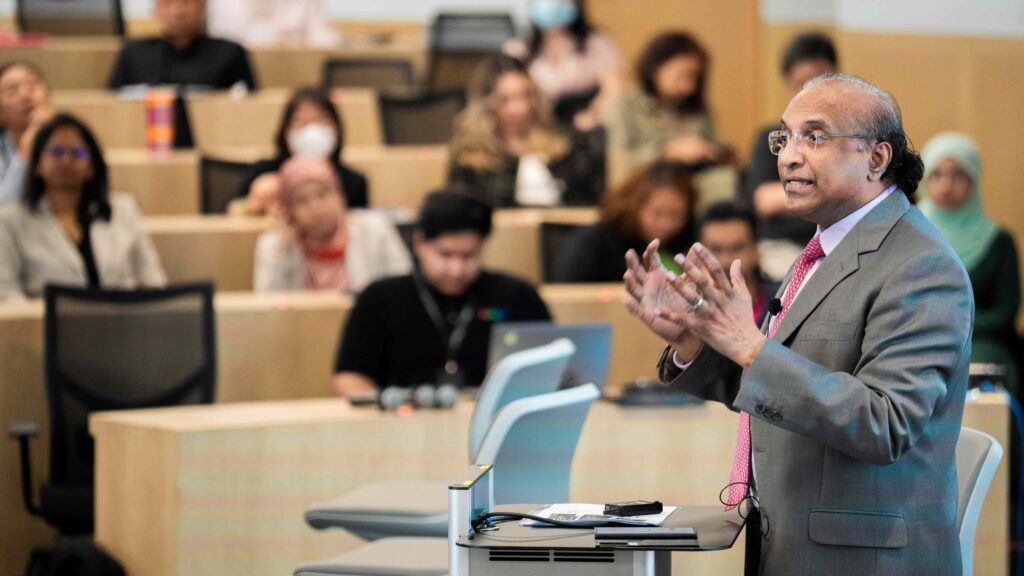The Green@Work Leadership Summit 2024, hosted by Asia School of Business (ASB), brought together global leaders, innovators, academia, and policymakers to discuss the crucial role of green technologies, green finance, and sustainable solutions in shaping ASEAN’s future.
The Summit provided a dynamic platform to address pressing issues across the business, energy, and finance sectors, sparking discussions on collaboration and ways to drive a more sustainable future for the region.
In his opening address, Encik Muhammad Hidayatullah Bin Nasrul, from the Ministry of Natural Resources and Environmental Sustainability, highlighted Malaysia’s commitment to becoming a regional leader in sustainability. “Malaysia is at a critical juncture where sustainability is essential, not optional. Initiatives like the Bursa Carbon Exchange and rising renewable energy investments signal our commitment to lead in sustainable development. Collaboration across sectors is key to ensuring our nation achieves its green goals while inspiring ASEAN to prioritize environmental resilience,” he said.
Throughout the Summit, key discussions revolved around the transformative role of green technology in driving economic resilience and environmental sustainability. Professor Sanjay Sarma, CEO, President, and Dean of ASB, emphasized that green technology is no longer a trend but a vital solution to the existential challenges the world faces.
“The global green tech market is projected to reach USD 62.4 billion by 2030, with Southeast Asia leading the way. Embracing these innovations is essential for ASEAN’s economic and environmental future,” he said.
The importance of circular economy models in scaling sustainable solutions was a key theme, with Zain Almohdzar, Co-Founder of Klean, Sarah Cragg Head of APAC Partnerships at The Earthshot Prize and M. Huzaini Ghazali, Chief Strategy and Portfolio Officer at Gentari discussing how transformative green technologies can address waste challenges in ASEAN.
Zain noted, “Circular economy initiatives are crucial in addressing waste challenges in ASEAN, where the region generates over 150 million tons of waste annually. Innovative technologies, such as advanced recycling systems and digital waste management platforms, are key to scaling these solutions and could potentially reduce landfill contributions by 25% within the next decade.”
Blended finance also emerged as a vital mechanism in supporting the green transition. Professor Joseph Cherian, Deputy CEO of ASB and Practice Professor of Finance, emphasized how blended finance can bridge the funding gap by bringing governments, businesses, and investors together, hence accelerating the green transition. “Blended finance is not just a tool, it is a catalyst that can unlock trillions in investments for green initiatives. From accelerating carbon market development to funding renewable energy projects, it creates pathways for public-private partnerships that drive large-scale impact,” he explained.
The intersection of green finance and regulation was another focal point, featuring a panel discussion moderated by Johan Rozali-Wathooth, CEO of Bintang Capital Partners. The panel included Muhammad Rizal Azmi, AVP of Business Development & Sales at Bursa Carbon Exchange, Salmah Bee Mohd Mydin, Executive Director of Market Development at Securities Commission Malaysia and Yin Shao Loong, Deputy Director of Research, Khazanah Research Institute. They explored how evolving regulatory frameworks can unlock new green financial solutions. Salmah Bee highlighted the rapid growth of Malaysia’s green bond market, noting a 50% increase in issuance over the past two years. “Regulatory frameworks must evolve to not only encourage but also scale these green financial solutions across ASEAN,” she emphasised.”
The Summit concluded with a call to action for participants to translate the insights shared into actionable solutions, reinforcing the collective responsibility to foster a sustainable future for ASEAN.
Originally published by Disruptr MY.





